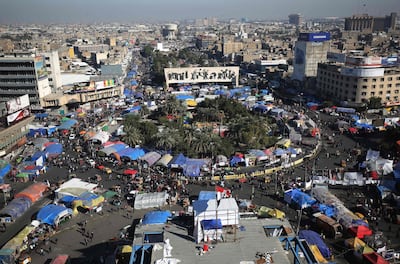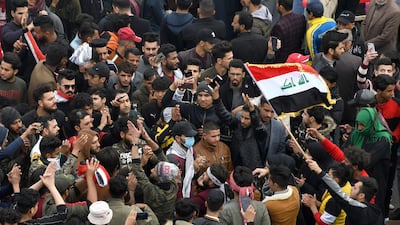Protesters flooded into Baghdad's Tahrir Square on Friday afternoon chanting “No, no to America! No, no, to Iran!”, in a revival of anti-government demonstrations that were sidelined by the US killing of an Iranian general in the Iraqi capital a week earlier.
Many Iraqis feared their country would become the battleground for a war between the United States and Iran after General Qassem Suleimani’s assassination on January 3, as both President Donald Trump and Iranian supreme leader Ali Khamenei exchanged threats and warnings.
The protesters, who for months had been calling for an end to government corruption and foreign interference in Iraq, found their demands pushed to the background as global attention turned to the possibility of a new conflict in the Middle East.
“We are showing all the people who tried to sow division among us that there is no division. We are united against the interference of foreign countries,” said Hussein Al Araby, a musician who hails from Basra but who has been living at the protest camp in Tahrir Square for weeks.
The anti-government protests in Baghdad and southern cities had persisted despite a government crackdown that took a heavy toll on protesters. State forces have killed more 500 people and injured thousands more since the demonstration began on October 1. The protesters have also faced a systemic campaign of kidnapping, arrest and torture, aimed at intimidating young activists.
But as hostility between the US and Iran rose, the number of demonstrators in Tahrir Square, the centre of the protests, grew thin.

After Iran launched missiles at US positions in Iraq on Wednesday without causing casualties, President Trump and Iranian leaders appeared to signal and end to the escalation. “We do not want war,” Iranian Foreign Minister Mohammad Javad Zarif tweeted, while Mr Trump said Iran appeared to be standing down.
With fears of a war dissipating, protesters called for a million-man march on Friday in hopes of breathing fresh life into the demonstrations. Young Iraqis began staging small marches in Tahrir Square on Thursday night with signs urging citizens to join the Friday's march and holding up posters with the faces of protesters killed or kidnapped so far.
On Friday, the square started to fill up again as more young people filed in, chanting for an independent Iraq. Similar scenes played out at other protest sites in Kutt, Hilla, Basra, Nasiriyah, Karbala and Diwaniya.
Mr Al Araby said he was happy to see people out on the streets again.
"No one can destroy this nationalist spirit. Our demands are legitimate and correct,” he said.
Eissawy, a protest organiser who declined to give his full name out of fear for his security, said the turnout reflected the strength of the movement.
"People were saying that the protests had lessened and grown quieter, but we wanted show that we could make a million-strong protest today or tomorrow. All the Iraqis are with us,” he said.
“Our demands are we want to change the political class ... change the election law."
The protest movement has been bolstered by the support of Iraq's top Shiite cleric, Grand Ayatollah Ali Al Sistani, conveyed through weekly sermons delivered by his representatives.
Prime Minister Adel Abdul Mahdi resigned in December after Mr Al Sistani suggested that parliament reconsider its support for the government. Mr Abdul Mahdi and his ministers are serving in a caretaker capacity until a new government can be formed.
In his latest Friday sermon, Mr Al Sistani condemned the US and Iranian attacks on Iraqi soil and warned of deteriorating security in the country and wider region as a result of Washington's standoff with Tehran.
He said the attacks were a violation of sovereignty and that no foreign powers should be allowed to decide Iraq's fate.
"The use of over-the-top methods by different sides which possess power and influence ... will only entrench the crisis and prevent a solution," Mr Al Sistani said.
"The latest dangerous aggressive acts, which are repeated violations of Iraqi sovereignty, are a part of the deteriorating situation" in the region, he said.

